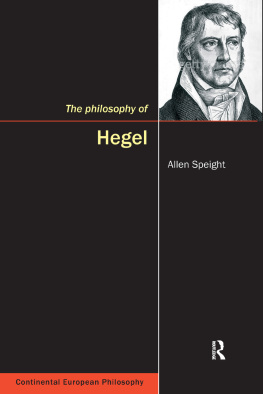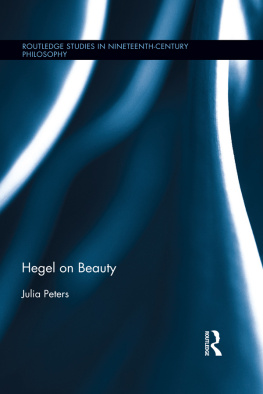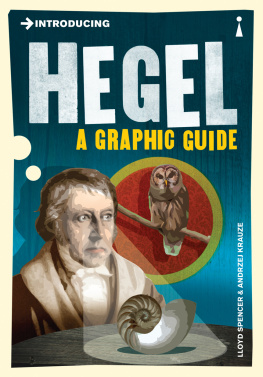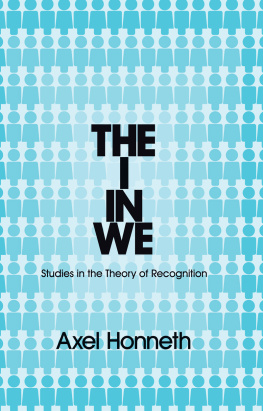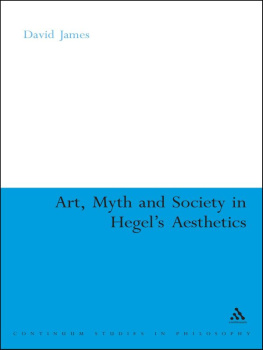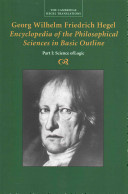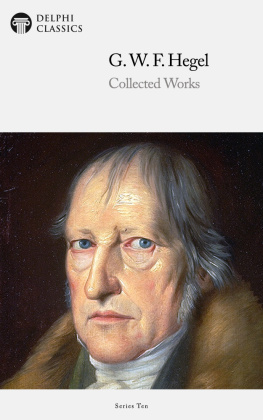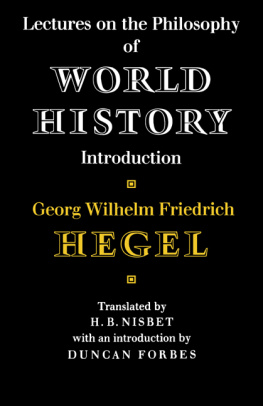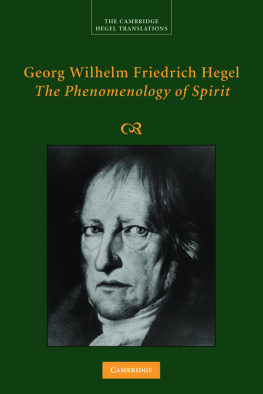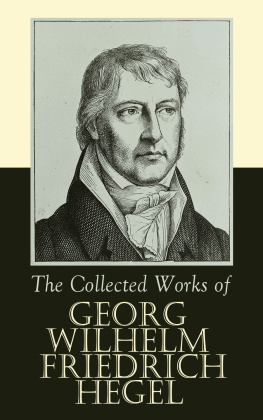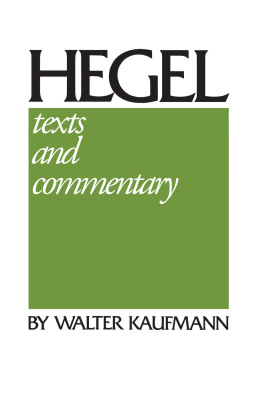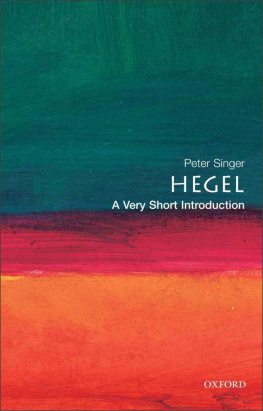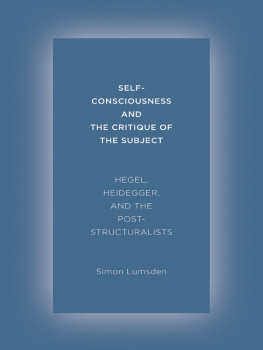Hegel Georg Wilhelm Friedrich - The Philosophy of Hegel
Here you can read online Hegel Georg Wilhelm Friedrich - The Philosophy of Hegel full text of the book (entire story) in english for free. Download pdf and epub, get meaning, cover and reviews about this ebook. City: Stocksfield U.k, year: 2008, publisher: Taylor and Francis;Acumen, genre: Science. Description of the work, (preface) as well as reviews are available. Best literature library LitArk.com created for fans of good reading and offers a wide selection of genres:
Romance novel
Science fiction
Adventure
Detective
Science
History
Home and family
Prose
Art
Politics
Computer
Non-fiction
Religion
Business
Children
Humor
Choose a favorite category and find really read worthwhile books. Enjoy immersion in the world of imagination, feel the emotions of the characters or learn something new for yourself, make an fascinating discovery.
- Book:The Philosophy of Hegel
- Author:
- Publisher:Taylor and Francis;Acumen
- Genre:
- Year:2008
- City:Stocksfield U.k
- Rating:3 / 5
- Favourites:Add to favourites
- Your mark:
- 60
- 1
- 2
- 3
- 4
- 5
The Philosophy of Hegel: summary, description and annotation
We offer to read an annotation, description, summary or preface (depends on what the author of the book "The Philosophy of Hegel" wrote himself). If you haven't found the necessary information about the book — write in the comments, we will try to find it.
Hegel Georg Wilhelm Friedrich: author's other books
Who wrote The Philosophy of Hegel? Find out the surname, the name of the author of the book and a list of all author's works by series.
The Philosophy of Hegel — read online for free the complete book (whole text) full work
Below is the text of the book, divided by pages. System saving the place of the last page read, allows you to conveniently read the book "The Philosophy of Hegel" online for free, without having to search again every time where you left off. Put a bookmark, and you can go to the page where you finished reading at any time.
Font size:
Interval:
Bookmark:

The Philosophy of Hegel
This series provides accessible and stimulating introductions to the ideas of continental thinkers who have shaped the fundamentals of European philosophical thought. Powerful and radical, the ideas of these philosophers have often been contested, but they remain key to understanding current philosophical thinking as well as the current direction of disciplines such as political science, literary theory, social theory, art history, and cultural studies. Each book seeks to combine clarity with depth, introducing fresh insights and wider perspectives while also providing a comprehensive survey of each thinker's philosophical ideas.
The Philosophy of Derrida
Mark Dooley and Liam Kavanagh
The Philosophy of Foucault
Todd May
The Philosophy of Gadamer
Jean Grondin
The Philosophy of Habermas
Andrew Edgar
The Philosophy of Hegel
Allen Speight
The Philosophy of Kierkegaard
George Pattison
The Philosophy of Merleau-Ponty
Eric Matthews
The Philosophy of Nietzsche
Rex Welshon
The Philosophy of Schopenhauer
Dale Jacquette
The Philosophy of Husserl
Burt Hopkins
The Philosophy of Kant
James O'Shea
The Philosophy of Sartre
Anthony Hatzimoysis
Allen Speight

First Published 2008
by Acumen
Published 2014
by Routledge
2 Park Square, Milton Park, Abingdon, Oxon OX14 4RN
711 Third Avenue, New York, NY 10017, USA
Routledge is an imprint of the Taylor and Francis Group, an informa business
Allen Speight 2008
This book is copyright under the Berne Convention.
No reproduction without permission.
All rights reserved. No part of this book may be reprinted or reproduced or utilised in any form or by any electronic, mechanical, or other means, now known or hereafter invented, including photocopying and recording, or in any information storage or retrieval system, without permission in writing from the publishers.
Notices
Practitioners and researchers must always rely on their own experience and knowledge in evaluating and using any information, methods, compounds, or experiments described herein. In using such information or methods they should be mindful of their own safety and the safety of others, including parties for whom they have a professional responsibility.
To the fullest extent of the law, neither the Publisher nor the authors, contributors, or editors, assume any liability for any injury and/or damage to persons or property as a matter of products liability, negligence or otherwise, or from any use or operation of any methods, products, instructions, or ideas contained in the material herein.
ISBN 978-1-84465-068-2 (hardcover)
ISBN 978-1-84465-069-9 (paperback)
British Library Cataloguing-in-Publication Data
A catalogue record for this book is available from the British Library.
Designed and typeset by Graphicraft Limited, Hong Kong
For conversations that enriched this book, I am indebted to many friends and colleagues who share a philosophical interest in Hegel. I am grateful to Steven Gerrard for his encouragement of the project and to two anonymous readers for Acumen Publishing who offered helpful suggestions for improving both the style and content of the manuscript itself. I wish also to thank Margot Stevenson and Sarah Farkas, for their bibliographical and editorial assistance, and Hallie Speight, whose love and support I cannot sufficiently thank in print.
Full bibliographical details of the works listed here are given in the Bibliography.
- Aesthetics Aesthetics: Lectures on Fine Art
- Enc The Encyclopedia Logic
- LPEG Lectures on the Proof of the Existence of God
- LPR Lectures on the Philosophy of Religion
- PhS Phenomenology of Spirit
- PR Philosophy of Right
- PWH Lectures on the Philosophy of World History
- SL Science of Logic
Hegel is the first great philosopher to make modernity - in all its historical, cultural and philosophical complexity - his subject. And on whatever lines that modernity is to be explored by our own present generation - as a project that has failed, is discernible only in traces, or that has come to fruition in some ways crucial for our practices and commitments - the Hegelian construal of it remains essential for coming to terms with how we understand ourselves, as agents in and contemplators of a world with a number of characteristics that Hegel was either the first or the most articulate in calling attention to. The sort of characteristics I have in mind are some rather resilient facets of a world that can be said to embrace both Hegel's day and our own, a world where the self and its awareness of its freedom is construed as an achievement, where the modern religious sense of a "death of God" has left a not entirely complete secularism and a seemingly irreducible plurality of religious perspectives in its wake, where the development of ethical and political institutions that "we" can in some sense be aware of "making" are nonetheless also subject to historical shifts and constraints, and where the realm of artistic expression has taken bold and inherently self-referential turns.
The account of modernity that Hegel opens up in these areas is, so I shall make the case, neither a triumphalist recognition and extension of Enlightenment values into the present time nor a philosophical act of mourning for the contradictions of a world that is in decline. Hegel's perspective whether one looks at his ethics, politics, art, religion or philosophy - is one that is resolutely embracing of modernity in its oppositions, a stance that makes him neither Romantic, Enlightenment rationalist nor (I shall claim) any merely hybrid combination of the two.
To cast an introduction to Hegel's thought in terms of his interest in the problem of modernity is not immediately to take sides on what remains a contentious point at the moment among his most skilled and creative contemporary expositors. As will be discussed below, a long debate about whether Hegel should ultimately be construed as pushing forward an essentially Kantian intervention in modern philosophy or as rather closer in spirit to his earlier and more metaphysically minded predecessors such as Aristotle and Spinoza appears to be still very much alive. By focusing on Hegel as a philosopher of modernity, I do not mean to oppose the view of what I call below "traditionalist" readers, but only to emphasize that, even if Hegel's project is ultimately construed in important ways as metaphysical, this metaphysics cannot simply be a move back to a pre-critical stance, as though the Kantian revolution in thought never occurred. The question of precisely what sort of post-Kantian metaphysics Hegel might be engaged in, if he is, will no doubt be a point of focus in the years to come among Hegelian scholars. But even the most ardent traditionalist readers of Hegel's works will have to acknowledge that the stance Hegel takes more broadly towards the politics and culture of the world between 1807 and 1831 is one that (however metaphysically or non-metaphysically grounded) never allows the possibility that the modern world can look back in ethical and political, aesthetic or religious thought.
Font size:
Interval:
Bookmark:
Similar books «The Philosophy of Hegel»
Look at similar books to The Philosophy of Hegel. We have selected literature similar in name and meaning in the hope of providing readers with more options to find new, interesting, not yet read works.
Discussion, reviews of the book The Philosophy of Hegel and just readers' own opinions. Leave your comments, write what you think about the work, its meaning or the main characters. Specify what exactly you liked and what you didn't like, and why you think so.

